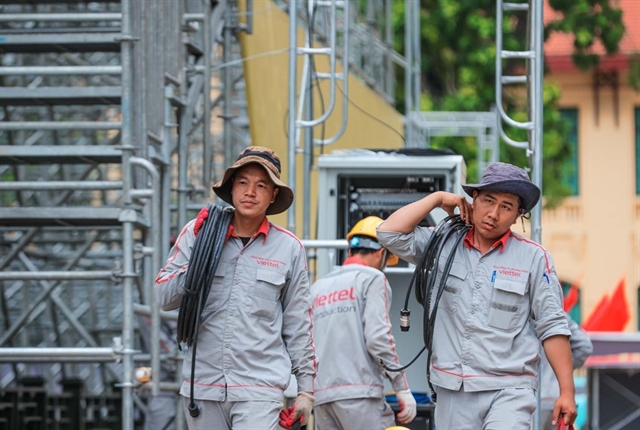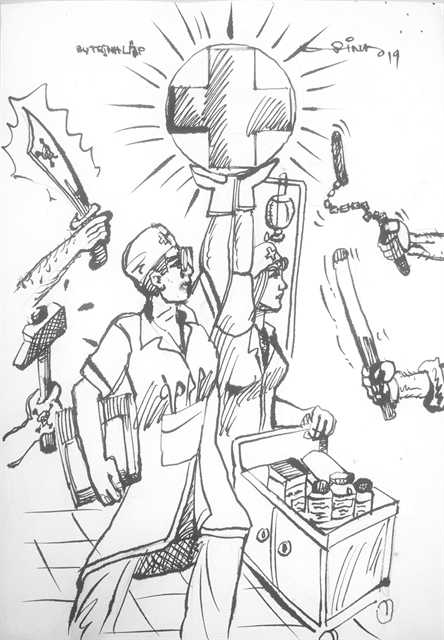 Talk Around Town
Talk Around Town

There are no current laws to protect practising medical workers against verbal and physical attacks.

|
| illustration by Trịnh Lập |
By Nguyễn Mỹ Hà
A couple of days ago, I was surprised to see the heading of a Facebook post by my friend that read “I will make you brightest on social media tonight!”
It turns out the quote was a threat made by a patient to a doctor, who was supposed to treat her eye, for which she was in hospital at night.
The incident took place at the National Institute of Ophthalmology in downtown Hà Nội. As a specialised hospital, many severely-ill patients from provinces in the north come here for the best treatment available in a public hospital.
As it’s located in Hà Nội, other patients in the city can come here for less severe injuries.
At the hospital, you also have the choice to pay extra for other services.
And this is where the issue started.
Even patients who paid extra need to wait in line, as doctors have to triage the cases and prioritise the emergencies.
“During my night shift, there were nine emergency cases, seven of which needed medical intervention as soon as possible,” she writes. “All of them had to go through paperwork and wait their turn. If we had nine operation rooms and nine doctors on duty, then all of them would be treated right away!”
“But it was not the case, so the 10th patient, who came in at 7.30pm with a minor scratch on her eye, after waiting for 30 minutes, came up to me and personally said the sentence I quoted.”
Eye injuries are usually not life-threatening, but an eye surgeon usually performs micro-surgeries, which require a different level of expertise. A tiny error can result in greater damage to one’s eyesight or worse, cause them to go blind.
No public records are available for such abuse or attacks against medical staff in the workplace.
“You know why medical staff are under attack?” the patient was reported as saying, “because you make patients wait this long!”
According to the latest Decision on Crime Prevention and Illegal Acts at Medical Establishments across the country signed by the Minister of Health in January 2019, notorious cases have been recorded, attracting a lot of public attention. These include a medical worker on duty who was stabbed by a patient’s relatives; two doctors attacked by a husband after they operated on his wife to save their unborn child but could not save the mother; and worse, a doctor on duty who was stabbed to death at Thái Bình General Hospital in 2011.
There are no current laws to protect practising medical workers against verbal and physical attacks. Even under threat of physical violence, doctors cannot refuse to use their expertise to save lives.
In the incident at the Institute of Ophthalmology, the doctor who assessed incoming patients could refer less-severely injured patients to a nearby clinic instead of accepting them. Secondly, in the exam room, hospital security had to do their job, which was escorting the patient to the waiting room area.
“We had to treat a patient with ocular rupture, scleral-corneal laceration, another had intraocular tissue laceration from being kicked in the eye by a rooster, and another one with endophthalmitis.”
The content of this decision aims at raising awareness among local administrative bodies, medical staff at all establishments across the country and families of incoming patients in order to reduce the crime rate targeting medical staff at work.
By the end of 2020, the decision aims to reduce crimes by between 15 and 20 per cent from the 22 cases recorded in 2017, enforcing security protection at all medical establishments in the country and ensure over 90 per cent of medical staff are fully aware of the current regulations to fight crime in the workplace. More than 90 per cent of the hospital and medical offices are also connected to and receive assistance from local police offices.
The decision also sets a goal for 2030 to raise all the above-mentioned targets to 100 per cent.
Back to the case at the Institute of Ophthalmology, the incident could have been peacefully resolved if the hospital’s security guards came to restore public order or escorted the patient to another quiet area so that doctors can continue their work.
And the threat to make her shine brightest on social media could have been avoided had a “No Photos Taking” sign been put up in the examining rooms of hospitals.
“At 9.30pm, we completed all the emergency cases scheduled during the day, then we had a quick bite for dinner and returned to the operation room at 10pm for yet another emergency case. At 11.40pm, a call came in, ‘Can you come down, a patient has been hit by a rake in the eyes’. Our night shift continued until next morning.”
Among the comments below that post, many strangers expressed sympathy with medical workers, understanding the limitations of over-flowing public hospitals and urging patients and their families to be more understanding of the situation and respect medical decisions.
“You did shine brightest tonight,” reads one comment, “but for a good reason. Keep calm and keep saving more eyes!” VNS